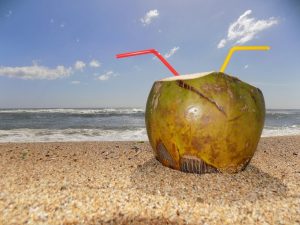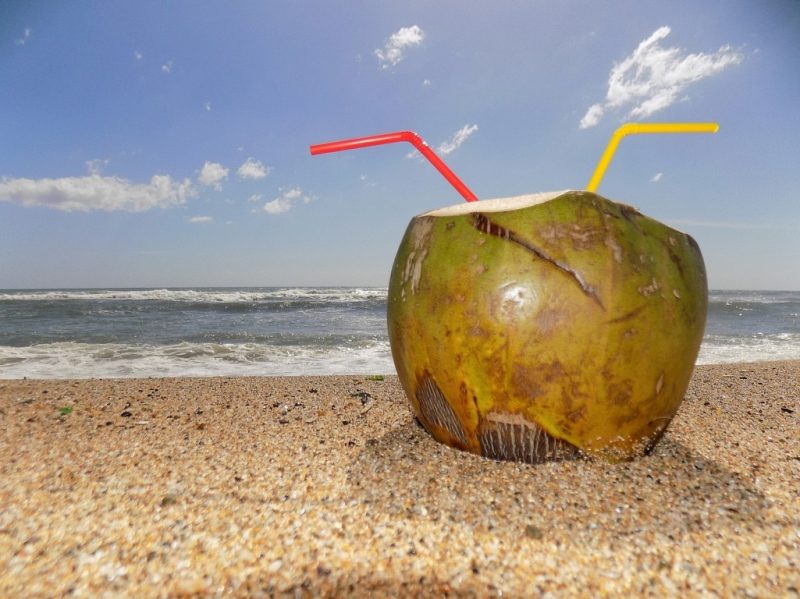 Coconut water is a new and exciting drink on the markets, popping up everywhere from your local convenience store to the hot new bar downtown.
Coconut water is a new and exciting drink on the markets, popping up everywhere from your local convenience store to the hot new bar downtown.
It’s sweet, refreshing and contains a wide array of good for you nutrients and enzymes.
It is often recommended as a substitute for Gatorade and Powerade for athletes that need electrolyte replacement because it has naturally high levels of the electrolytes potassium and magnesium.
Emerging science is also showing that coconut water is beneficial not only as a sports drink, but also benefits our digestive system and brain, having a restorative effect on both.
Are all coconut water healthy?
Not all coconut waters are the same however, some are no better than drinking a can of soda.
This is because of the processes necessary to get it ready for transport, as well as adding preservatives, sweeteners, and flavoring to make it more palatable.
Coconut water from a fresh young coconut is obviously the highest-quality product you can get, but what if you live where coconuts don’t grow?
Take a look at your grocery shelves and you will see scores of different coconut waters.
These are not all created equal, especially the shelf stable ones not found in the refrigerator.
Some have been pasteurized, some have been treated with formaldehyde or other preservatives, and some have added sugar and flavoring in them to mask the taste of low quality coconut water.
Why are some coconut water unhealthy?
Let’s take a look at why these coconut waters aren’t good for you.
Old Coconuts. Many producers of coconut water purchase older coconuts from farms because they’re cheaper and easier to transport.
However, as a coconut gets older, all of those fabulous nutrients seep out of the water and into the flesh (meat) of the coconut.
This is why older coconuts are better used for coconut milk or oil, but are not good for water.
The loss of nutrients also gives the coconut water an acidic taste that needs to be covered up.
Additional Sugar and Natural Flavors. Producers cover up the acidic taste of water that comes from the cheaper, older coconuts by adding sugar, ‘natural flavors’, fruit juice, or all three to the mix.
These additives will make the drink sweeter and more appealing to kids in particular, and can have lasting effects in your body.
Now you’re getting a low-quality drink with fewer nutrients, that also has sugar and other questionable ingredients added to it. Is that something you want to drink?
Pasteurizing. Coconut water is quite perishable and spoils very easily.
Most of the coconut water you buy in the store is pasteurized with high heat.
Basically, it’s boiled until all potential bacteria that would spoil the drink are dead.
This is good, no spoiled drinks making you sick, but pasteurization also kills any nutrients and beneficial enzymes in the coconut water leaving you with merely slightly sweet water.
It also changes the taste of the water, and again you’re back to having to add flavorings or sweeteners to it to make it taste the same as it would fresh from the coconut.
If it’s not in the refrigerated section of the store it’s almost guaranteed that it’s been high-heat pasteurized.
Preservatives. When a producer decides to purchase the coconuts and process them somewhere else the coconuts need to be preserved for transport.
Using this method can only be done with non-organic coconuts, as there are no organic preservatives that would keep the coconuts from spoiling.
Preservation is done in non-organic coconuts by dipping them into a bath of either formaldehyde or sodium metabisulfite.
Formaldehyde is a known carcinogen (something that causes cancer) that is often used to preserve dead bodies.
Sodium metabisulfite is part of the sulfite family, which is known to cause allergic reactions and body-wide inflammation for many people.
The Material Safety Data Sheet for sodium metabisulfite states that it is hazardous if it comes in contact with skin or eyes, and can be an irritant to the upper respiratory tract.
These preservatives can and do seep through the husk and into the meat and the water of the coconut.
The longer the coconut’s journey is the longer the preservatives have to get into your drink, and in turn into your body.
One way that manufacturers get around transporting the whole coconuts is by using coconut water concentrate instead of the water straight from the coconut.
This is done by boiling the coconut water until it becomes a thick syrup.
Water is then added back into the syrup right before it gets packaged for the store.
This syrup is much easier to transport, but again is missing all of the nutrients and enzymes that were killed off by the high heat of the concentrating process.
Using the syrup also makes it very easy for producers to add flavorings and sweeteners to improve the taste, circling back to points one and two.
What coconut water should we drink?
Coconut water has huge health benefits and is a delicious way to replenish the nutrients your body needs.
It’s best when you can drink it straight from a coconut that’s freshly picked, but that’s not possible for a large part of the world.
Buying coconut water in the grocery store is an exercise in reading ingredient labels, but how do you know which one to pick?
Look for the fewest ingredients. Ideally, the only ingredient would be coconut water, but look out for sugars, sweeteners, fruit juice, natural flavors, and concentrates on the ingredient list.
This brings us back to the question ‘is coconut water as good for you as you think it is?’
The short answer is yes, but only if you can find an organic product that doesn’t pasteurize, preserve, or otherwise alter the coconut water.
Your best chance will be to get one that needs to be refrigerated, has a short expiry date, and is labeled organic.
About the Author:
Emma Deangela is the best selling author of The Alkaline Diet Program and 80/20 Fat Loss. She has helped over tens of thousands of men and women to lose weight and transform their health with sound nutrition advice. Learn how you can lose weight fast – How to lose weight by adding these alkaline foods.
Do you like coconut water? Which brand of coconut water do you drink?
Please share with your friends this article on Coconut water – Use any of the social media and email buttons on the left of our website.
If you are concerned about getting enough nutrition needs, try Energize Max instead. They are having an End of Summer sale for the last week. Go to the next page and grab it before the special is over –


Leave a Reply